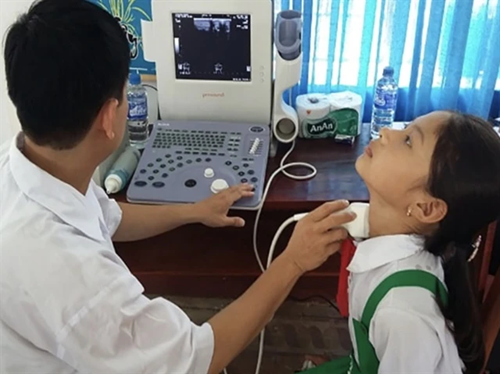Only 27% of households use adequately iodized salt, while WHO recommends over 90%.
    |
 |
|
(Photo for illustration: suckhoedoisong.vn) |
The results of National Nutrition Survey in Vietnam also revealed that the median urinary iodine concentration in children (over six years old) nationwide is 113.3 mcg/L, in mountainous children is 90.0 mcg/L, in women of reproductive age is 98.9 mcg/L, and in pregnant women is 85.3 mcg/L.
WHO's recommended level for children and women of reproductive age is 100-199 mcg/L, and for pregnant women, it is 150-249 mcg/L.
This shows that both the median urinary iodine concentration and the percentage of households using adequately iodized salt fall below WHO recommendations.
Based on these findings, it is clear that the Vietnamese population has not reached the recommended daily iodine intake.
With an aim to increase the micronutrients in food for Vietnamese people, on October 31, Deputy Minister of Health Do Xuan Tuyen chaired a meeting to gather input from organizations and businesses on the draft amendments and supplements to Decree No. 09/2016/ND-CP, dated January 28, 2016, on enhancing the addition of micronutrients to food.
Legal Department of the Ministry of Health reported that as of October 2024, the ministry received seven sets of opinions from organizations and business associations.
Of these, seven out of seven organizations agreed on the necessity of issuing the decree.
Four out of seven organizations, including WHO, UNICEF, Iodine Global Network (IGN), and HealthBridge Canada, fully supported the necessity and provided additional evidence to maintain the mandatory regulation of iodine fortification in salt, as well as the addition of iron and zinc to wheat flour.
Three of the organizations, including the Food Industry Association, AmCham, and VASEP, offered comments on the draft decree.
With these differing opinions, the Ministry of Health has considered and responded to each group of issues based on WHO recommendations, practical experience, and epidemiological studies.
At the meeting, representatives of business associations raised various recommendations regarding the classification of products for which iodine fortification should be encouraged versus products where it should be limited, the increased costs for businesses in adding iodine to processed products, and the impact on the sensory qualities of traditional products, which poses difficulties for businesses.
International organizations, as well as agencies and units under the Ministry of Health, addressed business concerns by providing concrete evidence from scientific research in many countries about the need and obligation to supplement food with micronutrients for public health.
This provides the basis for the draft amendment to Decree No.09 requiring iodine fortification in salt for direct consumption and in food processing.
Reports from the National Institute of Endocrinology and Metabolism and the National Institute of Nutrition indicate that Vietnam has not recorded any cases of iodine excess.
Additionally, the Ministry of Health has not received any scientific evidence from businesses showing that iodine-enriched salt affects the color, flavor, or has adverse health effects on consumers.
Therefore, previous claims by businesses were inaccurate and lacked scientific basis, which delayed the implementation of Decree No.09/2016/ND-CP for eight years.
During these eight years, Vietnam has seen little improvement in public health related to micronutrients such as iodine, iron, and zinc.
Based on this information, the ministry’s Legal Department is drafting amendments following the opinions of WHO, UNICEF, the National Institute of Nutrition, the Institute for Health Strategy and Policy, and other public health organizations.
The Deputy Minister requested that the Legal Department, which is leading the drafting of the decree, finalize the draft for submission to the government by November.
Specialized agencies, such as the Institute for Health Strategy and Policy, the National Institute of Endocrinology and Metabolism, and Bach Mai Hospital, are to review research data and submit formal reports to the Ministry of Health (to be sent to the Legal Department) by November 2024.
Deputy Minister Tuyen assigned the Institute for Health Strategy and Policy to coordinate with related units such as the Institute of Nutrition, the Department of Food Safety, and the Department of Preventive Medicine to address the technical concerns of businesses regarding Decree No.09/2016/ND-CP.
Source: VNA